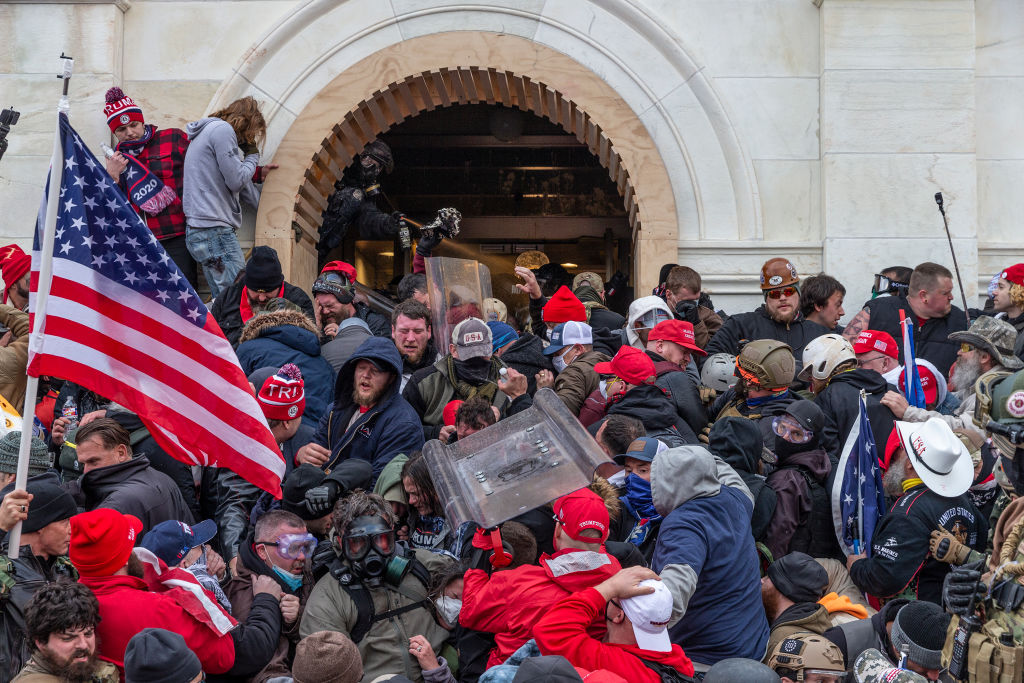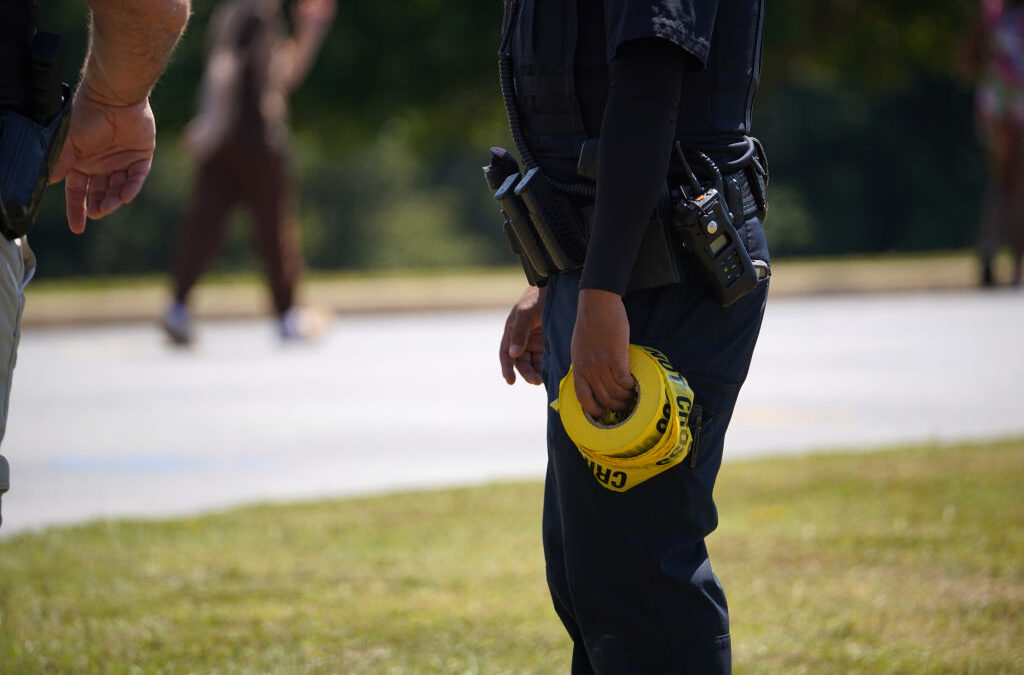The U.S. Supreme Court has issued a ruling that seemingly serves one purpose, which is to limit which defendants accused of participating in the Jan. 6 Capitol riot can be charged by federal prosecutors with obstructing Congress—which was the entire point of the Jan. 6 Capitol riot.
Source: Lev Radin/Pacific Press/LightRocket / Getty
From NPR:
In an opinion by Chief Justice John Roberts, the court ruled that the government must establish “that the defendant impaired the availability or integrity for use in an official proceeding of records, documents, objects, or other things used in an official proceeding.”
Prosecutors used a key criminal statute to prosecute more than 350 of the most violent participants in the riot.
The statute had two parts. The first part makes it a crime to corruptly alter or destroy documents and records related to an official proceeding. The second part makes it a crime to otherwise obstruct or impede an official proceeding—in this case, the congressional counting of the electoral college ballots.
Roberts said the statute was limited to documents and evidence destruction, and that the word otherwise was not meant to broaden the meaning of the law into a catchall provision.
So, I’m no expert on federal law, but it really seems like Roberts’ opinion is that the second part of the statute doesn’t count, which would mean it can’t be used to charge most of the people who took part in the riot with obstructing Congress because most of the rioters didn’t “destroy documents and records related to an official proceeding,” they only allegedly tried to stop Congress from certifying the results of the 2020 election, which, again, was the entire point of the riot.
Since it seems certain people need a refresher on recent history, the act of domestic terrorism in the U.S. Capitol only happened because former President Donald Trump and the MAGA-fied GOP spent the months following Trump’s legal and fair election loss to President Joe Biden spreading election fraud propaganda based on zero evidence, and that spread of misinformation prompted a mob of gullible MAGA minions to storm the Capitol building in an effort to stop lawmakers from making the election results official. Some people might call that an act of—what’s the word I’m looking for?—obstruction. (Mind you, 147 Republican legislators voted to overturn the election based on Trump’s “big lie” for which he and his legal team provided zero evidence to substantiate.)
In fact, the case was brought before the court by Joseph Fischer, a former police officer in a township near Harrisburg, Pa., who not only joined the mob that forced its way into the Capitol building but also recorded himself literally yelling, “charge,” as he and other rioters were rioting. He was also caught on video fighting Capitol police officers.
More from NPR:
According to prosecutors, Fischer, in text messages, also threatened violence prior to Jan. 6, including sending a text in which he wrote, “take Democratic Congress to the gallows….can’t vote if they can’t breathe lol.” And when the FBI came to arrest him later, he shouted profanities at the agents and at his own police chief, and he sought to conceal the phone he had used to record events at the Capitol.
So, according to prosecutors, Fischer sent text messages that indicated he planned to stop Congress from voting through violence, took part in a riot meant to stop Congress from voting through violence, and recorded himself instructing his fellow rioters to “charge” as they attempted to stop Congress from voting through violence—but none of that constitutes obstruction, because he didn’t destroy any official documents related to the congressional vote during the violence aimed at obstructing the congressional vote. Makes sense.
It’s worth mentioning that the approximately 350 defendants who have been charged with obstruction are a fraction of the more than 1400 Jan. 6 defendants who have been charged with crimes related to the attack, and legal experts told NPR that the effects of the decision will be “minimal.” Still, it just seems odd that the court is deciding that obstruction isn’t obstruction unless the destruction of paperwork is involved. It’s almost as if some terrorists have the complextion for protection and some don’t. But, again, I’m no expert here.
The U.S. Supreme Court has issued a ruling that seemingly serves one purpose, which is to limit which defendants accused of participating in the Jan. 6 Capitol riot can be charged by federal prosecutors with obstructing Congress—which was the entire point of the Jan. 6 Capitol riot.
Source: Lev Radin/Pacific Press/LightRocket / Getty
From NPR:
In an opinion by Chief Justice John Roberts, the court ruled that the government must establish “that the defendant impaired the availability or integrity for use in an official proceeding of records, documents, objects, or other things used in an official proceeding.”
Prosecutors used a key criminal statute to prosecute more than 350 of the most violent participants in the riot.
The statute had two parts. The first part makes it a crime to corruptly alter or destroy documents and records related to an official proceeding. The second part makes it a crime to otherwise obstruct or impede an official proceeding—in this case, the congressional counting of the electoral college ballots.
Roberts said the statute was limited to documents and evidence destruction, and that the word otherwise was not meant to broaden the meaning of the law into a catchall provision.
So, I’m no expert on federal law, but it really seems like Roberts’ opinion is that the second part of the statute doesn’t count, which would mean it can’t be used to charge most of the people who took part in the riot with obstructing Congress because most of the rioters didn’t “destroy documents and records related to an official proceeding,” they only allegedly tried to stop Congress from certifying the results of the 2020 election, which, again, was the entire point of the riot.
Since it seems certain people need a refresher on recent history, the act of domestic terrorism in the U.S. Capitol only happened because former President Donald Trump and the MAGA-fied GOP spent the months following Trump’s legal and fair election loss to President Joe Biden spreading election fraud propaganda based on zero evidence, and that spread of misinformation prompted a mob of gullible MAGA minions to storm the Capitol building in an effort to stop lawmakers from making the election results official. Some people might call that an act of—what’s the word I’m looking for?—obstruction. (Mind you, 147 Republican legislators voted to overturn the election based on Trump’s “big lie” for which he and his legal team provided zero evidence to substantiate.)
In fact, the case was brought before the court by Joseph Fischer, a former police officer in a township near Harrisburg, Pa., who not only joined the mob that forced its way into the Capitol building but also recorded himself literally yelling, “charge,” as he and other rioters were rioting. He was also caught on video fighting Capitol police officers.
More from NPR:
According to prosecutors, Fischer, in text messages, also threatened violence prior to Jan. 6, including sending a text in which he wrote, “take Democratic Congress to the gallows….can’t vote if they can’t breathe lol.” And when the FBI came to arrest him later, he shouted profanities at the agents and at his own police chief, and he sought to conceal the phone he had used to record events at the Capitol.
So, according to prosecutors, Fischer sent text messages that indicated he planned to stop Congress from voting through violence, took part in a riot meant to stop Congress from voting through violence, and recorded himself instructing his fellow rioters to “charge” as they attempted to stop Congress from voting through violence—but none of that constitutes obstruction, because he didn’t destroy any official documents related to the congressional vote during the violence aimed at obstructing the congressional vote. Makes sense.
It’s worth mentioning that the approximately 350 defendants who have been charged with obstruction are a fraction of the more than 1400 Jan. 6 defendants who have been charged with crimes related to the attack, and legal experts told NPR that the effects of the decision will be “minimal.” Still, it just seems odd that the court is deciding that obstruction isn’t obstruction unless the destruction of paperwork is involved. It’s almost as if some terrorists have the complextion for protection and some don’t. But, again, I’m no expert here.
The U.S. Supreme Court has issued a ruling that seemingly serves one purpose, which is to limit which defendants accused of participating in the Jan. 6 Capitol riot can be charged by federal prosecutors with obstructing Congress—which was the entire point of the Jan. 6 Capitol riot.
Source: Lev Radin/Pacific Press/LightRocket / Getty
From NPR:
In an opinion by Chief Justice John Roberts, the court ruled that the government must establish “that the defendant impaired the availability or integrity for use in an official proceeding of records, documents, objects, or other things used in an official proceeding.”
Prosecutors used a key criminal statute to prosecute more than 350 of the most violent participants in the riot.
The statute had two parts. The first part makes it a crime to corruptly alter or destroy documents and records related to an official proceeding. The second part makes it a crime to otherwise obstruct or impede an official proceeding—in this case, the congressional counting of the electoral college ballots.
Roberts said the statute was limited to documents and evidence destruction, and that the word otherwise was not meant to broaden the meaning of the law into a catchall provision.
So, I’m no expert on federal law, but it really seems like Roberts’ opinion is that the second part of the statute doesn’t count, which would mean it can’t be used to charge most of the people who took part in the riot with obstructing Congress because most of the rioters didn’t “destroy documents and records related to an official proceeding,” they only allegedly tried to stop Congress from certifying the results of the 2020 election, which, again, was the entire point of the riot.
Since it seems certain people need a refresher on recent history, the act of domestic terrorism in the U.S. Capitol only happened because former President Donald Trump and the MAGA-fied GOP spent the months following Trump’s legal and fair election loss to President Joe Biden spreading election fraud propaganda based on zero evidence, and that spread of misinformation prompted a mob of gullible MAGA minions to storm the Capitol building in an effort to stop lawmakers from making the election results official. Some people might call that an act of—what’s the word I’m looking for?—obstruction. (Mind you, 147 Republican legislators voted to overturn the election based on Trump’s “big lie” for which he and his legal team provided zero evidence to substantiate.)
In fact, the case was brought before the court by Joseph Fischer, a former police officer in a township near Harrisburg, Pa., who not only joined the mob that forced its way into the Capitol building but also recorded himself literally yelling, “charge,” as he and other rioters were rioting. He was also caught on video fighting Capitol police officers.
More from NPR:
According to prosecutors, Fischer, in text messages, also threatened violence prior to Jan. 6, including sending a text in which he wrote, “take Democratic Congress to the gallows….can’t vote if they can’t breathe lol.” And when the FBI came to arrest him later, he shouted profanities at the agents and at his own police chief, and he sought to conceal the phone he had used to record events at the Capitol.
So, according to prosecutors, Fischer sent text messages that indicated he planned to stop Congress from voting through violence, took part in a riot meant to stop Congress from voting through violence, and recorded himself instructing his fellow rioters to “charge” as they attempted to stop Congress from voting through violence—but none of that constitutes obstruction, because he didn’t destroy any official documents related to the congressional vote during the violence aimed at obstructing the congressional vote. Makes sense.
It’s worth mentioning that the approximately 350 defendants who have been charged with obstruction are a fraction of the more than 1400 Jan. 6 defendants who have been charged with crimes related to the attack, and legal experts told NPR that the effects of the decision will be “minimal.” Still, it just seems odd that the court is deciding that obstruction isn’t obstruction unless the destruction of paperwork is involved. It’s almost as if some terrorists have the complextion for protection and some don’t. But, again, I’m no expert here.
Comments
Bossip Comment Policy
Please read our Comment Policy before commenting.
The U.S. Supreme Court has issued a ruling that seemingly serves one purpose, which is to limit which defendants accused of participating in the Jan. 6 Capitol riot can be charged by federal prosecutors with obstructing Congress—which was the entire point of the Jan. 6 Capitol riot. From NPR: In an opinion by Chief Justice Bossip





